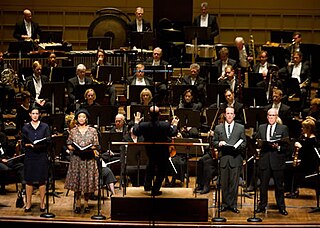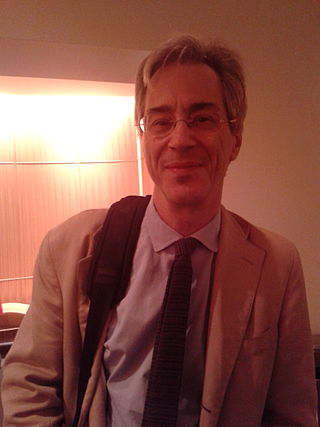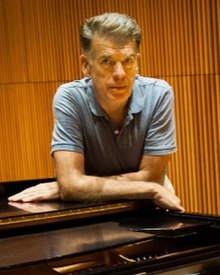Ellen Taaffe Zwilich is an American composer, the first female composer to win the Pulitzer Prize for Music. Her early works are marked by atonal exploration, but by the late 1980s, she had shifted to a postmodernist, neoromantic style. She has been called "one of America's most frequently played and genuinely popular living composers." She was a 1994 inductee into the Florida Artists Hall of Fame. Zwilich has served as the Francis Eppes Distinguished Professor at Florida State University.

Milton Byron Babbitt was an American composer, music theorist, mathematician, and teacher. He was a Pulitzer Prize and MacArthur Fellowship recipient, recognized for his serial and electronic music.
Shulamit Ran is an Israeli-American composer. She moved from Israel to New York City at 14, as a scholarship student at the Mannes College of Music. Her Symphony (1990) won her the Pulitzer Prize for Music. She was the second woman to win the Pulitzer Prize for Music, the first being Ellen Taaffe Zwilich in 1983. Ran was a professor of music composition at the University of Chicago from 1973 to 2015. She has performed as a pianist in Israel, Europe and the U.S., and her compositional works have been performed worldwide by a wide array of orchestras and chamber groups.
John Harris Harbison is an American composer and academic.

Steven Edward Stucky was a Pulitzer Prize-winning American composer.
Melinda Jane Wagner is a US composer, and winner of the 1999 Pulitzer Prize in music. Her undergraduate degree is from Hamilton College. She received her graduates degrees from University of Chicago and University of Pennsylvania. She also served as Composer-in-Residence at the University of Texas (Austin) and at the 'Bravo!' Vail Valley Music Festival. Some of her teachers included Richard Wernick, George Crumb, Shulamit Ran, and Jay Reise.
David Sartor is an American composer, conductor, and educator, and is the founder and music director of the Parthenon Chamber Orchestra.
Meriwether Lewis Spratlan Jr. was an American music academic and composer of contemporary classical music.

William Edward Childs is an American composer, jazz pianist, arranger and conductor from Los Angeles, California, United States.
Harold Meltzer was an American composer. Harold was inspired by a wide variety of stimuli, from architectural spaces to postmodern fairy tales and messages inscribed in fortune cookies. In Fanfare Magazine, Robert Carl commented that he "seems to write pieces of scrupulous craft and exceptional freshness, which makes each seem like an important contribution." The first recording devoted to his music, released in 2010 by Naxos on its American Classics label, was named one of the CDs of the year in The New York Times and in Fanfare; new all-Meltzer recordings issued from Open G Records (2017), Bridge Records (2018), and BMOP/Sound (2019). A Pulitzer Prize Finalist in 2009 for his sextet Brion, Meltzer has been awarded the Rome Prize, the Barlow Prize; a Guggenheim Fellowship, and both the Arts and Letters Award in Music and the Charles Ives Fellowship from the American Academy of Arts and Letters.
Kevin Matthew Puts is an American composer, best known for his opera The Hours and for winning a Pulitzer Prize in 2012 for his first opera Silent Night and a Grammy Award in 2023 for his concerto Contact.

Stephen Jaffe is an American composer of contemporary classical music. He lives in Durham, North Carolina, United States, and serves on the music faculty of Duke University, where he holds the post of Mary and James H. Semans Professor of Music Composition; his colleagues there include composers Scott Lindroth, John Supko, and Anthony Kelley. Jaffe graduated summa cum laude from the University of Pennsylvania in 1977; he received a master's degree the following year from the same institution. During his time in Pennsylvania, he studied with George Crumb, George Rochberg, and Richard Wernick.

Samuel Jones is an American composer and conductor.
Margaret Brouwer is an American composer and composition teacher. She founded the Blue Streak Ensemble chamber music group.

Laura Elise Schwendinger was the first composer to win the American Academy in Berlin's Berlin Prize.
Cindy McTee is an American composer and educator.
Victoria Ellen Bond is an American conductor and composer in New York City.

Yotam Haber is a composer based in Kansas City. He is a 2005 Guggenheim fellow, a 2007 Rome Prize winner in Music Composition., and was named a 2023-2024 Fulbright Distinguished Senior Scholar, teaching and researching at the Jerusalem Academy of Music and Dance.

David Froom was an American composer and college professor. Froom taught at the University of Utah, the Peabody Institute, and the University of Maryland, College Park, and he was on the faculty at St. Mary's College of Maryland from 1989 until his death in 2022. He has received awards and honors from the Guggenheim Foundation, the American Academy of Arts and Letters,, the Fromm Foundation at Harvard, the Koussevitzky Foundation of the Library of Congress, the Barlow Foundation, and was a five-time recipient of an Individual Artist Award from the State of Maryland.








